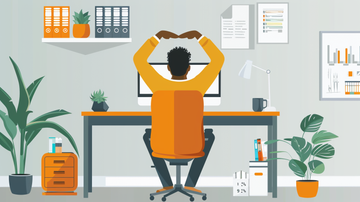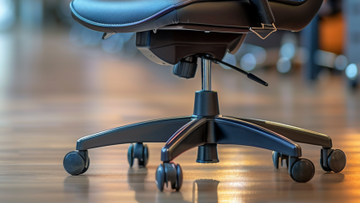Congratulations! You've landed your first job. You're a big kid now, right? Well, maybe not so much. If you're under the age of 18, there are still a few things you'll need to consider in order to ensure your safety at work. While many of these tips apply to adults as well (because let's be real: we all need help staying healthy and safe), they're especially important for new employees who are still forming their habits. So let's take a look at what we can do together as an employer and employee to keep ourselves safe on the job! Here are some helpful workplace safety tips for younger employees:
Wear your protective gear correctly.
When you work around dangerous machinery or chemicals, it's important to protect yourself. Wear your protective gear correctly, and use the right equipment for the job. If a piece of gear doesn't fit properly or if you have any doubts about its function, don't wear it at all. It's also important to check your gear regularly, look for signs of wear and tear, and replace anything that is past its expiration date or showing signs of damage. If you're unsure how to do this yourself (or even if you are), seek help from an expert who can teach you what to look out for and how to inspect your safety equipment properly.
Repetitive motion injuries are real.
Repetitive motion injuries are a common problem in the workplace. They’re so common, in fact, that they should be on your radar as an employee or employer. The Mayo Clinic defines them as “musculoskeletal disorders caused by repetitive motions, such as hand-wrist movements or finger bending and straightening.”
If you have one of these disorders (or even if you just suspect it), be sure to talk to your doctor about treatment options for managing the symptoms and avoiding further damage. Remember: It will only get worse if left unchecked!
Common repetitive motion injuries include carpal tunnel syndrome—which affects the nerves in your wrists—and tendonitis—which is inflammation of a tendon due to overuse or injury.
Report issues immediately.
If you're injured, or if you see something that's not right in the workplace, report it immediately. This is good for everyone: you can get the help needed to prevent further injury (and maybe even get a promotion), and your employer will know that they've got someone who cares enough about their job to speak up when something is wrong. If they don't want employees who are concerned about their own health and safety, then that's fine—you probably won't be working there much longer anyway!
If you don't report issues like these right away, then it'll be harder for people to trust your judgment when something does happen. Plus if a manager sees that you aren't willing to stick up for yourself or your coworkers, then they may decide not hire from within the company next time around.
Get plenty of rest.
Sleep is important for your mental health and physical health. Getting enough sleep every night can help you feel better and be more productive throughout the day.
In fact, a lack of sleep can lead to higher rates of depression, anxiety disorders, headaches and stomach problems. You might also find yourself eating more calorie-dense foods when you're tired because your body craves sugar as fuel when it's running on low energy levels (and if you're constantly tired then that's exactly how your body will feel).
When you're at work, keep your eyes peeled for hazards. If you see something that could be dangerous, report it to your boss immediately. Your employer should take care of it right away so that no one else gets hurt.
Cut back on the caffeine.
If you’re feeling nervous about your new job, the caffeine in your morning cup of coffee could be making matters worse. A diuretic, it can cause dehydration, leading to headaches and stomach issues and making it harder for you to fall asleep. It also increases heart rate and blood pressure, which can make you feel jittery or anxious over time. If these side effects are left unchecked (or if they were never even considered), they may lead to full-blown panic attacks—and that’s not a good look at work!
Caffeine isn't all bad: It can help improve alertness and focus when used sparingly throughout the day—but only if consumed in moderation (about 200 mg per day).
Get enough sleep every night. The amount of sleep you need varies from person to person, but most adults need seven to eight hours per night. If you're not sure whether you're getting enough sleep or not, try keeping track of your sleeping habits and see if they fit with the amount recommended by your doctor (or just check out this handy chart)If you’re a regular coffee drinker, try cutting back gradually over the course of a week. Your body will adjust, and you’ll likely feel less anxious without realizing it. If you need that morning cup, opt for decaf or an herbal tea instead..
Drink lots of water.
Drinking water is an important part of staying healthy and alert.
While you may not realize it, humans need to drink at least two liters (about four quarts) of water each day. That’s about eight glasses worth of liquid! Water helps keep your body functioning properly, so it’s important that you stay hydrated throughout the day in order to avoid fatigue, dizziness or headaches due to dehydration.
Water also helps regulate temperature inside your body by carrying heat away from hot surfaces and into cooler areas where it can be released safely without causing damage or injury. This process keeps us cool on hot days while preventing overheating when we exercise vigorously in cold weather conditions such as snowboarding or skiing for example).
Address stress proactively and openly.
Stress is a big part of the modern workplace. The more you work, the higher your stress levels will likely be. This is why it's important to address stress proactively and openly with your boss, colleagues, and even friends.
Stress can be a good thing—it encourages us to work hard towards goals we care about—but too much stress can lead to health issues like heart disease, depression, anxiety disorders and more. If you're experiencing excessive amounts of stress in your life due to work-related factors like long hours or unreasonable expectations from management or clients/customers/suppliers (or whatever else), there are steps you can take that will help reduce your overall level of distress:
-
Talk about it! It's easy for problems at work to become overwhelming; this happens when we keep them bottled up inside ourselves instead of sharing them with someone else who cares about us enough not only listen but also give advice on how best handle this situation at hand.* Make sure what goes down must come back up again! The most effective way that I've found so far is journaling--it helps me get everything out onto paper before bedtime.* Rest! Resting means sleeping 8 hours each night without interruption while still getting quality restful sleep; this means no bright lights after 9pm including cell phones whose white lights are still bright enough
Your workplace is no place to feel insecure or unsafe, no matter your age, including stress and mental health.
Stress is a normal part of life. In fact, it’s often good for us: it can help us stay alert, focused and motivated to complete tasks. But when stress is overwhelming or prolonged it can lead to mental health problems like depression and anxiety.
When you feel overwhelmed by stress at work, you may find that you become more withdrawn from your colleagues than usual. This could be because of feelings of insecurity at work or even just lack of time to socialise outside the office. But whatever the reason may be for this change in behaviour, it’s important that we don’t allow ourselves – or anyone else – to get caught up in such negative thinking patterns because they can quickly spiral out of control if left untreated.
Conclusion
With all of these tips in mind, you should feel more confident about your workplace and the health and safety of your employees. If you have any questions or concerns, please don’t hesitate to reach out! We’re always happy to help!









